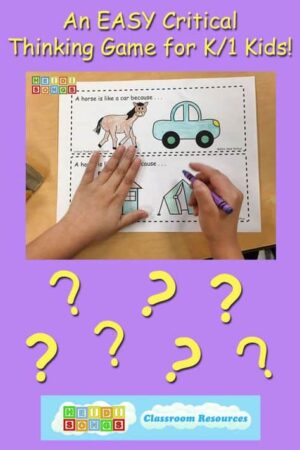
How to Foster Children’s
How to Foster Children’s Interest in Critical Thinking Grade 1
Children are naturally curious from infancy and they need to develop creative problem-solving and critical thinking skills as they grow up. Just like any other skill. But it’s important to note that the skills can be developed in any child, even if they’re not yet academically ready. Here are some tips for fostering children’s interest in Critical Thinking in grade one. Let’s get started!
First, develop a love of learning. Children naturally inquisitive, and they will be more engaged in learning if they are encouraged to question their own assumptions. For instance, a student’s favorite cartoon character will have the same color as a piece of art. Then, they’ll learn about color and shape. They’ll start analyzing things and will want to know more about them. In the end, they’ll be able to make better choices and make better decisions.
The activities in Critical Thinking grade one should be fun for students
The process should involve activities that tap into the natural curiosity of children. Playing games or doing writing activities that incorporate questioning will help children stay engaged. They will soon be able to apply the skills they’re learning. So, if you’re looking for a critical thinking book for your child, think outside the box. You’ll be pleased with the results!
When it comes to Critical Thinking, it’s important to have fun and engaging activities. Try engaging children’s natural inquisitiveness in games and creative activities. A simple way to motivate children is to include questions and writing activities that involve questions. And you can also use a variety of activities to develop critical thinking skills in grade one. But remember: you’ll be more successful if your students are able to engage in critical thinking exercises that involve questioning.
When choosing a critical thinking book for your child, you should focus on what interests them the most. It’s important that children are engaged in the process of learning and are able to understand the content and context of the book. You can encourage them to think about different subjects and how they relate to each other. For example, you can compare two objects to determine how they are related. They should have some similarities and differences in their behavior.
When introducing critical thinking skills
It’s important to make the activities fun and engaging. Using different techniques can help children become more aware of their cognitive abilities. You can also use art and creative thinking to encourage creativity and develop vocabulary. This is a crucial skill in school and life. So, don’t forget to implement critical thinking skills in your classroom. If your child loves these activities, it’s a sure way to succeed.
Another important way to teach critical thinking is to incorporate it into your daily curriculum. For instance, you can create a critical thinking activity that is related to a particular topic. For example, you could ask questions about the animal kingdom. By putting questions, you can get your child engaged in the process. Your children will develop these skills. This is crucial in school. And in order to do so, they need to be able to evaluate different information.
While there are many resources available
For children to practice critical thinking skills, you need to choose one that works for your child. For example, an engaging book for kids with an educational goal should not only be based on a specific theme, but it should also be age-appropriate. If you plan to do something differently, you can always ask a teacher for advice. If you are new to teaching, you can also help your child develop his or her skills by asking questions.
Developing the skills of critical thinking should be fun. Children should learn by doing activities that will stimulate their natural inquisitiveness. This can done through language integration and mathematics manipulatives. These two strategies should incorporated in writing activities. If you want your students to develop these skills, you should choose an activity that will involve them in the process. This is an excellent way to develop their academic vocabulary. You can even include a game that will challenge them to think critically.


Comments (0)